Pakistan, IMF to Revise Budget Targets Amid Rising Flood Losses
Pakistan and IMF are set to revise the FY2025–26 budget as flood losses exceed Rs. 650 billion. GDP growth may fall below 4%, with fiscal targets adjusted to sustain the IMF program amid rising economic pressures.

Pakistan and the International Monetary Fund (IMF) are in advanced discussions to revise the country’s budgetary and economic targets for the current fiscal year, as devastating flash floods have caused significantly higher economic losses than initially estimated.
According to officials close to the matter, the flood damage estimates have surged to Rs. 650 billion, up from the earlier projection of Rs. 371 billion, putting immense pressure on the government’s fiscal and growth projections. The GDP growth target of 4.2%, originally set in the annual budget, is now expected to be revised downward by 0.6 to 1 percentage point, potentially bringing growth closer to the 3.2%–3.6% range for FY2025–26.
“The earlier loss assessment only accounted for damages up to mid-September,” a senior official told The News. “However, the situation has worsened in several flood-affected districts, especially in southern Punjab, Sindh, and Balochistan, where infrastructure and agriculture have been hit hard.”
The official added that while Rapid Need Assessment (RNA) reports from provincial authorities have provided updated figures, these remain preliminary estimates. A final consolidated assessment is expected once international donor agencies — including the World Bank (WB), Asian Development Bank (ADB), European Union (EU), and United Nations Development Programme (UNDP) — complete their joint validation process in the coming weeks.
Fiscal Recalibration Underway
With damage estimates rising, the IMF review mission currently in Islamabad is collaborating with the Ministry of Finance to restructure the fiscal framework. The aim is to reflect the post-flood realities while keeping Pakistan’s ongoing $7 billion Extended Fund Facility (EFF) and Resilience and Sustainability Facility (RSF) on track.
The Federal Board of Revenue (FBR) is likely to see its tax collection target revised downward from Rs. 14.13 trillion to around Rs. 14 trillion, sources confirmed. Similarly, non-tax revenue targets are expected to be trimmed due to lower-than-anticipated inflows from state-owned enterprises and petroleum levies.
“The floods have disrupted not only agricultural output but also logistics, trade, and manufacturing activities,” said an economist at the Pakistan Institute of Development Economics (PIDE). “This will inevitably impact revenue collection and widen the fiscal gap unless spending priorities are adjusted.”
Despite the fiscal strain, the government aims to maintain its primary budget surplus target of 2.4% of GDP, a key commitment under the IMF program. Officials say this will be achieved through internal expenditure adjustments rather than public spending cuts.
Public Sector Spending Adjustments
The Public Sector Development Programme (PSDP), which currently stands at Rs. 1 trillion, is unlikely to be formally reduced. However, the release of development funds is expected to be slowed during the first half of FY2025–26 to manage liquidity pressures and control the overall fiscal deficit.
According to finance ministry sources, the government will prioritize projects that are either strategically critical or already near completion, while low-priority schemes may face funding delays. Among the priority projects are the FBR’s digitization initiatives, particularly the installation of new border management and monitoring systems, which have been allocated Rs. 20 billion this year.
The floods have also created additional fiscal demands, particularly for disaster relief, rehabilitation, and agricultural recovery. Provincial governments have been directed to prepare revised annual development plans (ADPs), focusing on reconstruction, housing, and infrastructure repair in the worst-hit regions.
Impact on Provinces and Fiscal Coordination
The provincial fiscal surplus target, initially projected at Rs. 1,465 billion, is now under review. With falling revenues and increased spending pressures, provinces are likely to post smaller surpluses, adding further complexity to Pakistan’s fiscal consolidation efforts.
An official from the Ministry of Inter-Provincial Coordination stated, “The provinces will be asked to re-prioritize expenditures while protecting essential services like education, health, and flood rehabilitation. Coordination between federal and provincial governments will be critical to meeting IMF’s performance benchmarks.”
The IMF team, led by mission chief Nathan Porter, has emphasized the need for fiscal prudence and better resource allocation. Discussions are focusing on maintaining macroeconomic stability, containing inflation, and ensuring targeted social protection programs under Ehsaas and BISP (Benazir Income Support Programme) to safeguard vulnerable communities affected by the floods.
Economic Outlook and IMF Engagement
The revised macroeconomic framework will be finalized as part of the IMF’s ongoing program review, which is a prerequisite for the release of the next $700 million tranche under the EFF. Pakistan has already secured $1.1 billion earlier this year following successful completion of the previous review.
Despite short-term challenges, economic managers remain optimistic that Pakistan’s macroeconomic stability will hold, supported by strong remittance inflows, record exports of IT services, and a recovering industrial sector. However, the IMF has cautioned that climate-induced disasters such as floods continue to pose significant risks to growth, inflation, and fiscal consolidation efforts.
Economists have also urged the government to expedite climate resilience investments and infrastructure upgrades to mitigate future losses. “Pakistan needs to move beyond reactive disaster management and invest in preventive infrastructure,” said Dr. Hafsa Malik, an environmental economist. “Integrating climate resilience into national planning is no longer optional—it’s an economic necessity.”
Global and Domestic Response
In response to the flood devastation, several international partners have expressed willingness to provide emergency financial assistance and technical support. The World Bank is reportedly considering reallocating $200 million from existing projects to finance immediate reconstruction efforts, while the ADB has proposed a $150 million resilience support package.
Domestically, the government has announced subsidized loans for small farmers, housing reconstruction grants, and incentives for the private sector to participate in rebuilding efforts. The National Disaster Risk Management Fund (NDRMF) has also begun mobilizing additional resources through partnerships with development agencies.

 Ateeq Ur Rehman
Ateeq Ur Rehman